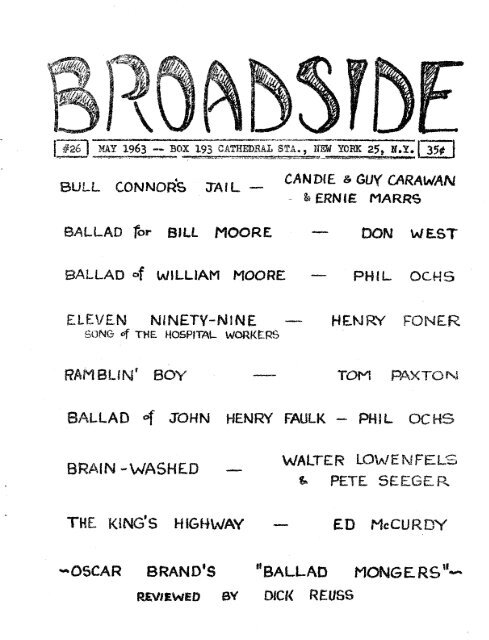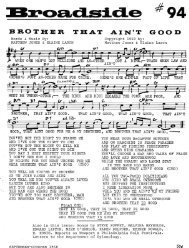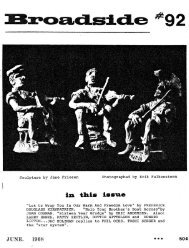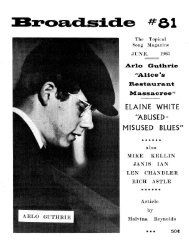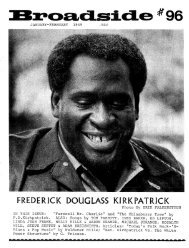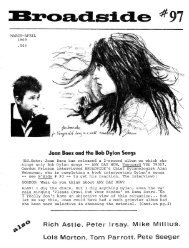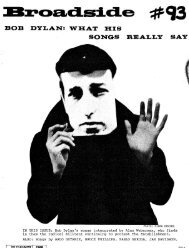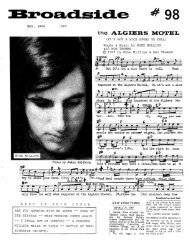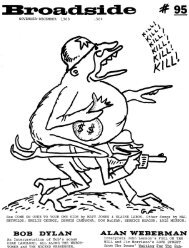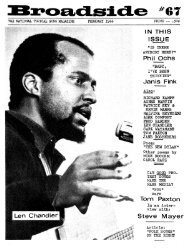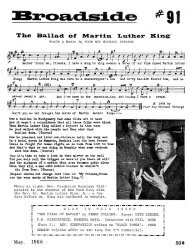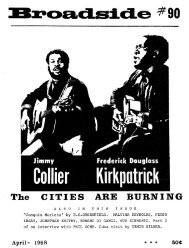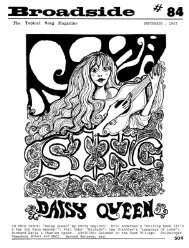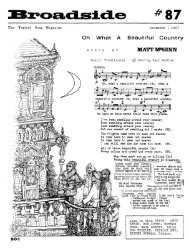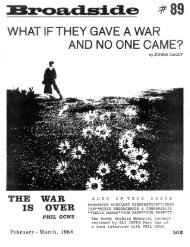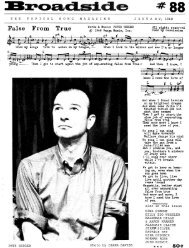Create successful ePaper yourself
Turn your PDF publications into a flip-book with our unique Google optimized e-Paper software.
..<br />
BULL CONNORS<br />
JAIL-<br />
CANDiE & GUY CARAWAN<br />
- &t ERNIE MARRS<br />
BALLAD for BIll MOORE - DON WEST<br />
e;~LLAD of WILLIAM MOORE PHIL OCH5<br />
ELEVEN<br />
NINETV-NINE<br />
SONG of THE. HOSPITAL WORKtRS<br />
HENRY<br />
FON£R<br />
RAMBLIN f<br />
BOY<br />
TOM<br />
PAXTON<br />
BALLAD of JOHN<br />
HENRY FAULK -- PHiL OCH5<br />
BRAIN -WA5H£D<br />
WALTER LOWEr
BALLAD FOR BILL 1,100RE News J;~m: On April 17,1963 Rev.<br />
Billy Graham wired Rev.Hartin<br />
Luther King Jr .. to nput<br />
By Don vlest Tune: "That<br />
c author 1963 Lonesome Valley"<br />
the brakes on a little bit!'<br />
Chorus:<br />
On April 26 an Alaban:!l<br />
o Bill Hoore walked that lonesom.e<br />
judge found Rev .. lang and<br />
highl,vay,<br />
nine other Negro leaders<br />
He dared to walk there by himself;<br />
guilty of contempt and gave<br />
None of us here ,\.,e.1'e 'HaUling with him, a fine and jail sentences ......<br />
He walked that hlghwayby himself.<br />
Meanwhile U .. S. Attorney<br />
G.ener.~l Robert Kennedy paid<br />
Yes, he vlalked to Alabama<br />
He walked that road for you and me,<br />
In his life there was the purpose -<br />
That black &: ,,,hite might both be free ..<br />
He walked for peace, he walked for<br />
freedom,<br />
He walked for truth, he walked for right<br />
End secregation in this country<br />
Eat at Joe's; both blaelt &-: white ..<br />
\Chorus}<br />
The lynohers' bullets know no color<br />
As they come whining thru the night,<br />
Theyfve brought death to !!lany a negro<br />
And vlil1iam Hoore whose skin was white ..<br />
They shot him down in cold blood murder<br />
Two bullet holes vlere in his head,<br />
His body lay upon the road-way<br />
tfuere lynchers left him cold &: dead ..<br />
(Chorus)<br />
Each man must walk his lonesome<br />
high't.,ay<br />
Each m:ust decide it for him.se If ,<br />
No one else can do that for you -<br />
You've got to walk there by yourself!<br />
a "courtesy call if on the<br />
Alabama governor ... ~.Then<br />
flying back to the Capitol,<br />
he, with other 'lilashington<br />
officials, went hiking a<br />
long the Chesapeake &: Ohio<br />
Canal on April 27.<br />
During this period another<br />
h1.ker, Uilliam Moore,walked<br />
southern roads carrying a<br />
message with an appeal for'<br />
decency to southern governors<br />
• .A big friendlY,smiling,peaceable<br />
family man<br />
with three children, Bill<br />
.Hoare carried a sign: HEnd<br />
Segregation in America -<br />
Eat At Joe's Both Black and<br />
l:lhite rl , and on the other<br />
side: "Equal Rights For Allu<br />
But he was never to deliver<br />
his message to the governors.<br />
On the night of April 23 he<br />
was shot to death on a lonely<br />
stretch of U.S. Highway<br />
11 near Attala, Alabama~<br />
Bill Hoore is a symbol.<br />
His name will go into the<br />
Some day we'll all walk there together legends of folk: lore of the<br />
And ,,!e f 11 knock on Freedor;x1 s door<br />
common people who eternally<br />
And l.f they ask, who was l.t sent you, yearn for friendly human revie<br />
l 11 say a man named \,Jilliam ~loore oS! lations" His CH>ln words, If I!?<br />
it.not normal to want.~~ood<br />
He walked for peace, he_ walked for freedom yllll toward m~n?n l1.e nea7Y<br />
He 'tV'al.ked for truth, he walked for right upo~ th~ consc1.en~e of the<br />
End segregation in this country<br />
natl.on In. these tlmes demand<br />
Eat at Joe f s, both black &: white.. ing decislon •. ·<br />
_ _ ------_~_ '._~~.. -:- Don lrlest<br />
______ ~ ~---~ .<br />
... ~ ...... _.ae=: _~ -;--~~~~~~~~~~:: --.~--~.~-<br />
~ .... ~~:..-<br />
ir -- -.... -- .::-. - . !If .... i,..·<br />
.. 'i<br />
• 6 .-,. •<br />
• ~-.. . fL \[.- ~~--
BAMBLI!P BOY By Tom Paxton<br />
~ 1963 b, author<br />
In tulsa town we ehaneed to strf!1<br />
We though.t we f d try to york one day<br />
The 'boss said h$ had room for one<br />
Said.my old pal, w~'d l."lathel"'bu."lt"<br />
enOl"US<br />
Late one night :tn ·a jungle camp<br />
Tht~ 'Weather it. wa.s oolr.l and damp<br />
He g("t th$ chills and h~ got • am 'bad<br />
They tool!. the only friend. ! b..'\d ..<br />
C;ho~us<br />
Ho lef1:; me here ·to I'amble on<br />
My ramblin t pal is dead &nd gone<br />
If. wh~n w~di* W~ go somewhere<br />
I 'bet yon a dollar he t it a-rambl.:ln I<br />
th9!"1'lf"<br />
Choru.s
Briskly<br />
BALLAD OF WILLIAM MOORE<br />
By Phil Oohs<br />
o 1963 by author<br />
man.<br />
* - - vent by the name of William Moore<br />
Now what are you doin', William Moore<br />
Why the letter in your hand<br />
There is only one southern land<br />
And he went by the name or William Noate.<br />
Rememberin t what his grandfather done, tought tor the south in t6l<br />
A hundred years have passed by since. thea; now Moore is tightln'<br />
for the south again .<br />
Rememberin' what his grandfather done.<br />
Rememberln' the time in World War II, and the South Pacific Island<br />
that he knew<br />
Remomberin" the youn.g men, that he killed, and the prayin' that the<br />
guns of hate be fltilled ..<br />
Rememberin t the time in World Wa~ II. gA6~US<br />
And they shot him on the Alabama road- they forgot what the Bible<br />
Shot him with that letter in his hand, as tho' he were a ~<br />
~og and not a man<br />
And tl'H:~:r<br />
shot him on the Ala bams road<br />
Did you say it was a shame when h~ died- Did you say he wa~ a tool<br />
because he t:rled .<br />
Did you wonder who had fired the gun- Did you know that it was you<br />
. tha t fired the gun .<br />
DJ.d you say it was a shame when he died? Qr&llt§.<br />
IfRp,¥m:tPI:m
BULL CONNOR'S JAIL<br />
(Tune: Birmingham Jail)<br />
Down in Alabama,<br />
in the land of Jim Crow<br />
There is a place lfhere<br />
lots of folks go.<br />
Cho: ~irmingham jailhouse<br />
Birmingham jail<br />
Waiting for Freedom<br />
In Bull Connor's jail.<br />
Three thousand prisoners;<br />
more coming in<br />
Even little children<br />
are singing this song.<br />
(Chorus)<br />
Bull Connor tells us,<br />
IIDon t t raise a squa'Ylk,<br />
You need a permit<br />
even to '
1~<br />
'.<br />
HI<br />
. _._ . __ ~L<br />
k ~r \,.,.....,... '- 41<br />
. 1. If you see a stran- ger stumbling on the road, Stt!p up ~.t1d<br />
~§0.:1~: :i~::;bj B:;¥#=::?:¥BS*E;~$<br />
- otter to $hare his load; Call him JOur brother and give '" him your<br />
oh--...1!·· .. . ., . ~~---< i<br />
~-=~<br />
.t..::::::,<br />
~:::::r.=:.-...£,-............<br />
'. ..<br />
:r:<br />
'",.--::z.x<br />
AI II '....._ •._,......l-..<br />
hand, Th:;n va lk alont together to the Prom1~ed<br />
Land:"- And. you will<br />
~~}fhll::.t:t@EH;Ul~T¥§f§:~:g~<br />
walk in glory, you will walk in peaoe, To a land wh~re trouble and<br />
~~;E~l1#[RElf~!iittgZE~<br />
sorrow ---- Ce$ll!U); - You w111 walk to .... gether in the cool of' the<br />
~~--rn@t]m~:t€A~fJ::~<br />
~<br />
day~ For rou will be walkin, on the Kinc's High - vay.~---<br />
;2" If' the t:ltorm. cloUd$ gather as t.;he night d..raws<br />
near .<br />
Keep on your journey, and never f$~r<br />
!l.:m, t t get d1sco'Url'lged, what~Pler you do<br />
For there is a power to carry you through<br />
. (Chorus)<br />
3 .. TheI'4!;fs; a light thatt~ shining from within<br />
your hf3al"t<br />
That will make the shadows of darkness part<br />
And light up the pathway wherever you roam<br />
And the lost and lonely can follow it home.<br />
(Chorus)<br />
, 'UP<br />
BROADSIDE :# 26<br />
• $" ." .... ~ ..
trials & 'the troubled trail he walked,<br />
c<br />
~J£l;~~@~~~:t§~M~~~~~~=~~~~<br />
ty:rr.·wts, the ones you never see; Murder Is t:he role they' P &i:tcl<br />
~~~~~~~-~<br />
i1atl'€d ls their fee., --there,. Oh that list:<br />
the TY and the radio John lienry Fa:ullt was kno~l'i'.n<br />
talked to 111an" thousands with a mind that was his own<br />
But could not close his eyes when the lists \1l€Jl"€) passed around<br />
86 rie trif1d to lntHts the Unlon to tear the blackl:Lst dO'iIil'!1«<br />
3. his fri(,Jllds they tr.ied to 'M'arn h:tm he W;j,g hltHtdin~ for "a<br />
If h,e spoke against th~~ bla.cklist, he hacl no (.;;h.c'l.I1,c.e at rill f e"ll<br />
But he laughed away their warnings &- he lt1.llght1td a.way' the:ll." ft&:,!'S.l"'S<br />
F~o.r hmu' eCfuld lies de:~tro~l" the wo,rk of llUU1Y honc'st yaal's a<br />
4, Then slowly, oh so sliOwly~ h:Ls 11f0, 'b~~g.an to change<br />
Peol)le \'1ould avo:td his eyes, his friends were aetin f<br />
stra:nge<br />
And htj :finally sa·'tl the power ot th(-.) hldden pOison pen<br />
,,-Then 'they told. him that h:ts job wa~;; th.t~UIl hetd navel' wo~rk again,,,<br />
5 ... JUld he could not bel:teV'e what hi.s sad eyes ha.d f~cnll1d<br />
He stfH'od disoeliof ~\f:> h1s l.<br />
For every :plt:we h~ turnad t() go tht-lt; list "lttou,ld soon 'be thel'~<br />
Oh~ that list",<br />
6", there I&H1Y 'bo"tt;ort! to the fE\$.l:'S t:tu;;.t; grow il1l;lid@l<br />
Is the!'e tiny 'tH:rt;t~om. t.o hat.e th.;.;Lt YCHl nYLtst hid~<br />
And is there any end to that long 1'."08.9. erf' d0sp~J.r<br />
'-,:" {~hif't''';' ~?';":r """'N ,,",,4, 4'-h,e, ''",'''
John Hen.:r'Y Faulk (continued)<br />
8. Hey you blac:kl:i~t7 YOllblaekl1st,I!ve seen what you. ll!::iJi'\~ dCJ.ne<br />
I r 'Ve seen the men yt.'Hl rulrled. and the lives you tr:tad t,) ~t:'u,n<br />
But the one thing that I l 'tre [(')una is ,the only ones you spare<br />
Are those that do not have a brain., O!' those that d() not cara,.,<br />
9 .. And you men who point your f'ing~rs &: spread your l:tes arotllld<br />
You men who left your soul behind and drag us to the ground<br />
You can P1l.t my nam.e 1"1ght down there? I will not try to ~J.d('t<br />
For i~ therets one man on the blacklist I'll be right there by<br />
hi~ side.<br />
- -+<br />
>§I!i<br />
i/1 th/.s<br />
-~<br />
d.a;' ~/
'~'TOTES: The clippings of the current tragedy on Ne'\'.T Yor[~ IS BOvlery pro<br />
'Iri(;.e a background for the po';'lerfully compassionate song 'lJ'ritten by<br />
Bo'~ Dylan,tlOnly A Hobo II , which appears on the nel., 12" 'oUn-Jays LP<br />
BROj~SIDE BALLADS VOL.I. The record contains 13 other topical songs<br />
from the pages of BROADSIDE. Through special arrangement with ~o~~vays<br />
it can be gotten for $3 e OO(incluo.es postC;3.ge and handling) from OAK<br />
Publications, 121 Hest Y'7th St., Ne'lrl York 36, N.Y. OII "Train A-Travelin'<br />
in BROADSIDE 'i:f 23 is copyrighted by the author, Bob Dylan. Hedy "Jest<br />
sends the music for her father i s song IIHattie Carroll lt \>lhichwas also<br />
in .~k 23. And again in #23, in Peter Crabtree's song "It Ain't Really<br />
True i ! in the last line of the chorus the phrase Hcan't be" should be<br />
substituted for the 1;lord tf ain t til. jOt) The 6th verse of Don lroJest IS<br />
t1Ballad For Bill Hoore ft in this issue is by Sis Cunningham ••• Phil Ochs<br />
has Hr:t tten a nevT set of verses for his IILou Harsh" and vIe 'I 11 try to<br />
get them into our next issue .... SPACE LAG~ '\lIe I "Ire received about six<br />
f1!OI'O T~resher songs for which we did not have the space this time .....<br />
Current No e 1 on the BROADSIDE Hit Parade: Halvina Reynolds' "Little<br />
BOXGS II (# 20) ~ •• Ne"Ts stories indicate mile Shall Overcome ll is the leading<br />
song in Birmingham; in 2nd place: "Ain It Gonna Let Nobody Turn Us<br />
Aro'Unc}l' ("rhich is also on the BROADSIDE LP, sung by The Freedom Singers)<br />
"" ~ \1e still have a little mimeographed songbook put out by vloody<br />
Guthrie in 1946. He cut the stencils a.nd turned the mimeo crank himself<br />
and tried to peddle it around for t,.,ro bits '\4Tith fev! takers. In<br />
it are some of the songs \-lh1ch have become famous. ~-fe 'Here reminded<br />
that t!This Land" is in there '\41hen we received the latest Hevrsletter<br />
put out by the 1;Joody Guthrie Children's Trust Fund (Rm •. b'Oi;'-;2"06West<br />
57th St .. , New York 19,N.Y.). The newsletter notes that "Th:i.s Landll<br />
has been recently-recorded no less than eight times, on all the big<br />
labels -- Hel'CUrY1HGM,Warners,Columbia,RCA-Victor -- and by such artists<br />
as The Limel tel's, Peter Paul &: l1arY1 Flatt & Scruggs ~ Hm'l Christy<br />
Hinstrels, Harry Belafonte tetc ••• In the ne\'ls~etter H1's. Harjorie<br />
Guthrie reports that Woody s condition moves on dOi.'mhill but he is<br />
fighting it every inch of the "VlaY. "His memory remains uncanny but he<br />
just doesn't haVe the muscular control it takes to tmouth~ the words~<br />
His balance is very poor ••• he looks like he is about to fall any m~.nute'Q<br />
.. but he remains standing! •• To see him light a cigarette is really<br />
to se e a man fight ing for his life.. Yes, he "mnts to live t.:I<br />
- -----------------------<br />
BOO Ie REVIEvl<br />
Oscar Brand, ~ Balla.,g Hon e s: Bis,e Of ~ l10dern ~ &.. Q))g,<br />
Funk and vlagnalls, Inc. l'Te'\41 York, 1962)", 232 pp.<br />
Fifteen years after the beginning of a new popular interest in<br />
folk song, the first full length book treating \·,rith the current "folt-rtl<br />
sc~ne is upon us '-lith the recent pUblication of Oscar Brand t s Tl1..,g<br />
l2.,9·Alad Il9.llge r..§.. One has very mixed reactions reading this \vorko It is<br />
important if for no other reason that it is the first book of its kind;<br />
the first to try to set dei-m in some detail what in essence has gone<br />
into the forging of the folk song reVival of young Americans. It is<br />
breezy, chatty, and good reading. It is sometimes informative and<br />
critically observant. Yet the reader is never sure of what Brand is<br />
trying to write: a history, an autobiography, or a sociological com.<br />
mentary. Elememts of all three enter but in (continued -.~ )
f<br />
I!allS!!i Ho.ng§.1;..~ _... 2<br />
no measurable consistent manner. The book is partly biogr&,phical; it<br />
is certainly not all balanced history; and nowhere dOes he really elaborate<br />
from which point of view, that of the historian, the socia.l<br />
commentator or the biographer, one is to view his work.<br />
In any book purporting to etva a comprehensive picture of a given<br />
subject, there is a tendency to bite off more than one can chew and<br />
digest. To cover the whole folk song revival is an enormous chore<br />
in itself what with all the r~storieal, philosophical, psychological<br />
and eesthetical problems involved. But Brand extends himself even<br />
beyond this before lie is through three chapters by attempting to e:;;:<br />
nlain all the various elements in traditional American folk song and<br />
in children!s songs in 50 pages. Alan Lomax, controversial though he<br />
may be, has been 'W'orki~ on such problems for years. Richard 11" Dorson<br />
produced a whole book, ~mericaq Folklpre in attempting to analyze and<br />
detail the nuances and various sources making up the American folk<br />
scene, including'folk song. Brand may teel that since he is writing<br />
for the general reader, he ought to include a few chapters on such<br />
background material! but the individual interested enough to pick up<br />
~ ~21laq ~bngers ~n the first place urAoubtedly is aware at least to<br />
some degree of the various elements inherent in our nationt s music_,<br />
If not, he could easily be referred to Dorsants excellent work or to<br />
similar "tt1!'itings in a paragraph or two rather than having Brand devote<br />
20% of his book to a basie primer l-Ihich isntt necessary for the majo:L"'"<br />
ity of readers.<br />
The book's fourth chapter, UThe Antique Arttt is couched in chatty<br />
terms but contains a good many hints as to why folk songs and folk<br />
singing have been caught up by the maSses of urban Amertcans in recent<br />
years.. Chapter 5, "Setting The Sta«eu .t:10ves from the theoretical to<br />
the historical-biographical, neither in great depth, but this is not<br />
Brand's fault so much, for out of necessity he must treat a good many<br />
subjects within the confines of one chapter. The work of Ives, Leadbelly,<br />
Sandburg and Niles in the pre-war days is more generally knovln<br />
by the public at large than that of the Almanac Singers, upon whom<br />
sone attention has been recently focused in a serios of articles in<br />
Broadsid~ (#7,8,9-10,15). \ihat is needed and what Brand could have<br />
provided, having known the Alrnanacs as individuals, was a sta.tement<br />
assessing the contributions of the Almanacs in relation to the pre-'!!J'ar<br />
wortc of Ives, Josh \,lli1te, Niles, etc. In other words, Brand presents<br />
a compOSite of those who made important marks on the small folksong<br />
minded public prior to 1943.<br />
Between the good but not great chapter on the pre-'itTar urban folk<br />
song activity and the tv.l'O very fine chapters on the 'liJeavers and the<br />
blacklisting problems of the riid 1950's, occurs one of Th~ Bal1~<br />
Mongers' great weaknesses; its failure to treat of the influence of the<br />
left-wing on the urban folk song scene~ The brief period between 1945-<br />
1950 was an era of feverish radical song activity, spearhead~d by<br />
People I s Songs which Bra.nd discusses in a mere two pa,es t but also involving<br />
left wing youth groups such as the American youth For Democracy,<br />
the singing support of Henry Vlallace in the 1948 campaign, and culminating<br />
finnlly in the Peekskill riots of late summer, 1949_<br />
Brand 1s of course hampered by the fact that he really cantt discuss<br />
these past events at length because too cany people with going<br />
careers might be hurt by his namin, individuals. Also the author


